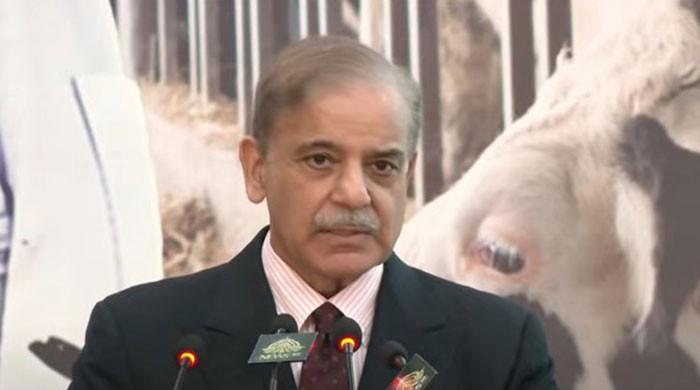PM Highlights Pakistan-China Friendship, Focus on Agriculture
- In the initial stage, 300 graduates will receive a 3-month training in China.
- The second phase of the initiative will involve 400 individuals in a 6-month program.
- The Prime Minister has urged graduates to implement new techniques to increase per acre yield.
ISLAMABAD: Prime Minister Shehbaz Sharif underscored the importance of the bond between Pakistan and China, acknowledging Beijing’s crucial role in securing Islamabad’s International Monetary Fund (IMF) program. He stated that the program would not have materialized without China’s assistance.
The Prime Minister made these remarks during a ceremony for the PM’s initiative focused on enhancing the capabilities of 1,000 agriculture graduates in China. His statement referenced the recent agreement between Islamabad and the IMF regarding the initial review of the ongoing $7 billion bailout program, which is set to last 37 months.
Following approval from the IMF Executive Board, Pakistan is expected to gain access to approximately $1 billion under the Extended Fund Facility (EFF). This will bring the total funds disbursed under the program to around $2 billion.
The IMF is expected to consider approving approximately $2.3 billion within a six-week timeframe. It is anticipated that Islamabad will secure this loan in the first week of May 2025, prior to the financial year 2025-26 budget.
The international lender also announced a new 28-month arrangement, which is pending board approval. Pakistan stands to unlock $1.3 billion through a climate resilience loan program that will span 28 months.
During his address, the Prime Minister stressed that China is among Pakistan’s most reliable allies, consistently providing support during challenging times.
Reaffirming his dedication to transforming the agriculture sector, Prime Minister Shehbaz emphasized its vital role in achieving lasting economic growth. He noted that strengthening the country’s agricultural base is essential for ensuring food security, increasing exports, and improving the livelihoods of millions of farmers.
The Prime Minister highlighted the need to revitalize and modernize the nation’s agricultural research institutions, stating, “We must concentrate on practical farming methods, digital crop management, and the development of climate-resilient seeds.”
Under the initiative, 300 selected graduates will be sent to China for a three-month training program during the first phase.
In the subsequent phase, 400 graduates will participate in a six-month training program. The remaining 300 graduates will then undergo a three-month training program in the final phase.
At the event, the Prime Minister congratulated the 300 young graduates who will travel to China for training in agricultural techniques to gain valuable knowledge. He expressed his hope that they will contribute to Pakistan’s agricultural economy upon their return.
Reflecting on his recent trip to China, PM Shehbaz shared that he was deeply impressed by the agricultural research conducted at various Chinese universities.
He stated, “I decided to send 1,000 young Pakistani agriculture graduates to benefit from this great experience.”
He expressed his regret that the initial two attempts to send graduates to China were unsuccessful due to an inadequate selection process. He emphasized his desire to select talented young individuals who represent the future of the nation.
The Prime Minister noted that “In the first and second efforts, the vast majority of the selected graduates were government officials who were beyond the appropriate age.” He then ordered the development of an online portal to ensure transparency in the application and selection process.
“Now I am pleased to see that the entire process is being completed transparently and purely on merit,” he added.
He mentioned that graduates from all regions of Pakistan, including Azad Jammu and Kashmir (AJK) and Gilgit-Baltistan, were included in the selection process, and the quota for Balochistan was increased by 10%.
He advised the graduates to dedicate themselves to their training in China and to bring back modern techniques and experiences that can improve the per acre yield of crops, particularly cotton and other cash crops.
The Prime Minister also announced that the government plans to offer subsidized loans to farmers to encourage entrepreneurship aimed at enhancing the value of various fruits and vegetables.
Minister for National Food Security and Research Rana Tanveer Hussain stated that under PM Shehbaz’s leadership, the government is working to enhance productivity in the agriculture and livestock sectors.
He highlighted the government’s investment of over Rs3 billion to provide young agricultural graduates with firsthand knowledge and experience from China.
He voiced his optimism that these graduates will effectively apply their new skills and knowledge upon returning to Pakistan.
The Ambassador of China to Pakistan, Jiang Zaidong, shared that he was impressed by the Pakistan government’s performance over the past year, during which the country’s macroeconomic indicators have shown significant improvement.
He affirmed that the Chinese government is committed to cooperating with Pakistan to strengthen bilateral relations, particularly in the agriculture sector.
He emphasized President Xi’s dedication to their relationship with neighboring countries.
Under the China-Pakistan Economic Corridor (CPEC), China has made a direct investment of approximately $35.4 billion, demonstrating the strong bond between the two nations.



Comments (0)
No comments yet. Be the first to comment!
Leave a Comment